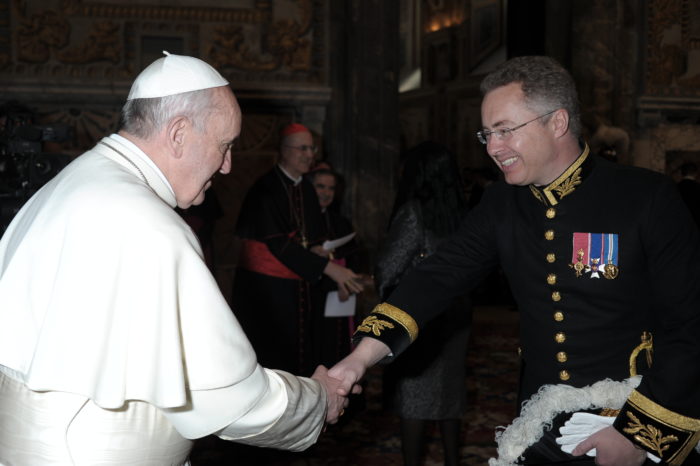18th May 2016
Pontifical Diplomacy


The international activism and high profile of Pope Francis has generated renewed interest in the nature and practice of the Holy See’s diplomacy. Just in the last week, the Pope visited the Pontifical Ecclesiastical Academy – the papal diplomatic college – to meet the young priests preparing there to take up their role as a member of the Holy See’s diplomatic service. Cardinal Parolin, the Secretary of State and senior diplomat in Papal service, has spoken a great deal recently about the Holy See’s international role, not least during a visit to the Baltic States. And a new book, La Diplomazia Pontificia, has just been published, written by the young Italian researcher Matteo Cantori, that seeks to set out the history and development of the Pope’s diplomacy.
The Holy See has always played a diplomatic role. It was once the most important destination for envoys from other countries – one of the reasons why my embassy, by virtue of the despatch of an ambassador to the Holy See by King Edward IV in 1479, is the oldest embassy in the British diplomatic service. Cardinal Parolin has set out some of the Holy See’s modern international priorities, including “the promotion of peace, respect for humanitarian law in the case of conflict, disarmament, the peaceful use of nuclear energy, human rights, including the right to life and religious freedom, the care of migrants and refugees, integral human development, environmental protection, the protection of the cultural and artistic heritage of humanity, the provision of sufficient food resources, adequate health-care, education, and so on”. And in order to further these aims, the Pope has a network of ambassadors, known as Apostolic Nuncios (the word comes from the Latin verb nuntio, from which our own word “announce” derives). There were 35 Nuncios back in 1950. The Holy See has relations with over 180 states today. Pontifical diplomacy is a global concern.
It is also, I think, changing. Under Pope Francis, Papal nuncios are expected to be more proactive, responding to the international demands of the first Pope from the New World. The Holy See is increasing its representation at multilateral organisations, such as the United Nations. And like all diplomatic services around the world, it has to respond to the new circumstances in which we find ourselves: a globalised world with a 24 hour news cycle, in which diplomats have to be able to act with speed and flexibility without losing the professionalism and discretion which is the hallmark of the calling. The sort of creativity this demands has been seen in recent Papal activities, such as Pope Francis’s visit to Lesbos to highlight the migration crisis, or his decision last year to open the Holy Year of Mercy not in Rome, but in war-torn Bangui in Central African Republic.
Holy See diplomats are also fundamentally different. They are, first and foremost, priests, and a key part of their job is to be the link between Rome and local Bishops’ Conferences. That was the Pope’s message to those in training at the Ecclesiastical Academy – never forget your primary vocation. It means they bring a wholly different perspective to the diplomatic scene. And this is something that is of immense value to those of us tempted to forget that the diplomatic role – in essence, working for the peace and prosperity of our countries – is in the end about the dignity and well-being of the people we serve.
I think that Pope Francis is the best Pope we have from many years…. He is more open minded and he takes the people close to the Church.